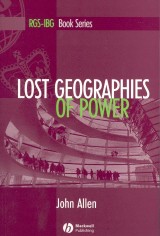Details

Lost Geographies of Power
RGS-IBG Book Series 1. Aufl.
|
25,99 € |
|
| Verlag: | Wiley-Blackwell |
| Format: | |
| Veröffentl.: | 15.04.2008 |
| ISBN/EAN: | 9780470775141 |
| Sprache: | englisch |
| Anzahl Seiten: | 228 |
DRM-geschütztes eBook, Sie benötigen z.B. Adobe Digital Editions und eine Adobe ID zum Lesen.
Beschreibungen
This original study explores the difference that space and spatiality make to the understanding of power.<br /> <ul> <li style="list-style: none"><br /> </li> <li>Explores the difference that space and spatiality makes to an understanding of power.<br /> </li> <li>Moves forward the incorporation of ideas of space into social theory.<br /> </li> <li>Presents a new understanding of the exercise, uses and manifestations of cultural, economic and political power in the second half of the twentieth century.<br /> </li> <li>Illustrated with cases and examples.</li> </ul>
Series Editors' Preface. <p>Acknowledgements.</p> <p>Chapter 1: Introduction: Lost Geographies.</p> <p><b>Part I: Spatial Vocabularies of Power.</b></p> <p>Chapter 2: Power in Things: Weber's Footnotes from the Centre.</p> <p>Chapter 3: Power through mobilization: From Mann's Networked Productions to Castells' Networked Fictions.</p> <p>Chapter 4: Power as an Immanent Affair: Foucault and Deleuze's Topographical Detail.</p> <p><b>Part II: Lost Geographies.</b></p> <p>Chapter 5: Power in its Various Guises (and Disguises).</p> <p>Chapter 6: Proximity and Reach: Were There Powers at a Distance before Latour?</p> <p>Chapter 7: Placing Power, or the Mischief Done by Thinking Domination is Everywhere.</p> <p>Chapter 8: Conclusion: Misplaced Power.</p> <p>Bibliography.</p> <p>Index.</p>
“Allen moves the debate on power into the everyday effects of human social action. In so doing he not only enriches the debate in numerous ways but also shows how theoretical discussion of power can no longer avoid addressing power’s inherent spatiality.” <br /> <i>John Agnew, Department of Geography, UCLA</i><br /> <p><br /> </p> <p>“John Allen provides new maps of the spatiality of power. The wonderful thing is not just that some familiar accounts are revitalised, but also that new forms of understanding power are born.”<br /> <i>Professor Nigel Thrift</i><br /> </p> <p>John Allen offers us a refreshing and provocative account of power in social theory, attending in particular to one of its missing dimensions, that of space ... this is an attractive book, welcome in particular for its attention to the complexities and multiple modalities of power."<br /> <i>American Journal of Sociology</i><br /> </p> <p>"<i>Lost Geographies of Powers</i> is a subtle and well argued book. It deserves a wider readership than its title suggests and should be read by social scientists in general, not just geographers."<br /> <i>Area</i></p>
<b>John Allen</b> is Professor of Economic Geography at the Open University. His recent publications include <i>Re</i>thinking the Region: Spaces of Neoliberalism (1998, with Doreen Massey and Allan Cochrane) and <i>Human Geography Today</i> (1999, with Doreen Massey and Phil Sarre).
<i>Lost Geographies of Power</i> offers a compelling account of the difference that space makes to our understanding of power. The aim of the book is to unsettle the idea that power can be held, centred in people and institutions, and transmitted intact across the contemporary landscape. We have lost sight, in the everyday sense, of the ways in which proximity and reach, distance and mobility, place and presence, actually shift the register of power. We have lost sight too, certainly among geographers, of the diversity of power – that authority, coercion, seduction and manipulation are neither one and the same thing, nor reducible to the business of domination. <p>Drawing upon the work of social theorists who have implicated space in their reasoning of power, such as Max Weber, Hannah Arendt, Michael Mann, Michel Foucault and Gilles Deleuze, the author sets out their spatial vocabularies of power and highlights their limitations.</p> <p>It makes vital reading for anyone interested in how power actually 'works' in and across society. This book will be invaluable for students and academics in human geography, sociology, cultural studies and politics.</p>
“Allen moves the debate on power into the everyday effects of human social action. In so doing he not only enriches the debate in numerous ways but also shows how theoretical discussion of power can no longer avoid addressing power’s inherent spatiality.” <br /> <i>John Agnew, Department of Geography, UCLA</i><br /> <p><br /> </p> <p>“John Allen provides new maps of the spatiality of power. The wonderful thing is not just that some familiar accounts are revitalised, but also that new forms of understanding power are born.”<br /> <i>Professor Nigel Thrift</i><br /> </p> <p>John Allen offers us a refreshing and provocative account of power in social theory, attending in particular to one of its missing dimensions, that of space ... this is an attractive book, welcome in particular for its attention to the complexities and multiple modalities of power."<br /> <i>American Journal of Sociology</i><br /> </p> <p>"<i>Lost Geographies of Powers</i> is a subtle and well argued book. It deserves a wider readership than its title suggests and should be read by social scientists in general, not just geographers."<br /> <i>Area</i></p>

















